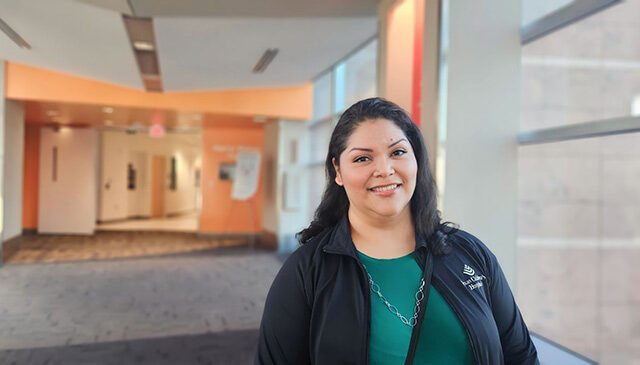
Language barriers can be challenging to overcome, especially in a health care setting. Imagine not being able to understand a diagnosis or treatment from your caregiver – it can be frustrating and quite scary. This is where the valuable members of our Language Services team step in and help break down those barriers.
Interpreter Margarita Cruz went to work one morning not knowing the pivotal role she would play in helping her colleagues and a patient’s family. She is used to bridging the communications gap for staff and patients regarding discussions around care. This time, she had to assist a family when a patient passed away shortly after giving birth. This was a new challenge, but she was ready and willing to help.
In the past decade in the Pavilion for Women, there have not been any adult patient mortalities. The PACU staff wanted to do everything they could to assist the patient’s family acknowledging the importance of cultural sensitivities and emotional complexities they could face with a Spanish-speaking family. They contacted Language Services for assistance, and Margarita offered insight in how best to approach the family with empathy, understanding and support.
“It was hard to separate my emotions, but after I expressed my sympathy for the family and staff, I had to focus on my task at hand,” said Margarita. “I’m just glad I could help navigate difficult conversations, provide cultural insight and ensure effective communication during this challenging time for the family.”
On that day, she was so much more than just an interpreter, she was a source of comfort and clarity for the grieving family.
“She went above and beyond and took care of the family like they were her own,” said Chaplain Tony Lee. “She provided an avenue of connection and familiarity to the family’s culture and comfort that none of us could have.”
This is just one of many ways our Language Services team plays a role in our patients’ care. They receive more than 32,000 language requests per month – 4,000 in-person interpretations, 16,000 over the phone, and 12,000 Video remote Interpretations through mobile devices or VRIs where an external interpreter can be contacted via live video. These capabilities enable Texas Children’s to provide interpretations in about 250 different languages.
The team has 28 interpreters dispersed across several campuses with Spanish being the most requested language for interpretation followed by Arabic, Vietnamese and Chinese-Mandarin.
They don’t just assist with clinical care. In a recent Caught You Caring recognition, Melanie Vasquez was praised for helping a patient and family who spoke Arabic only. She went out of her way to coordinate with My Dining to figure out what was Halal on the menu for them. She took it a step further and translated all of the Halal options into Arabic for the family.
If you need assistance from Language Services, you can reach out via email: languageservices@texaschildrens.org or by calling 832-824-5200 to review their resources and availability.


